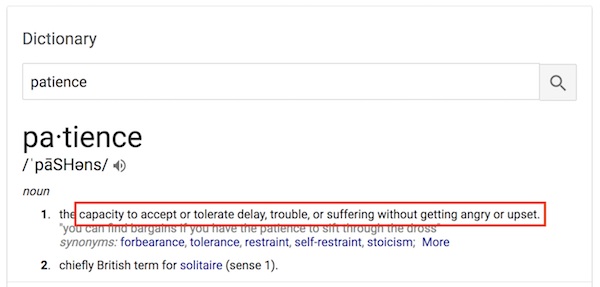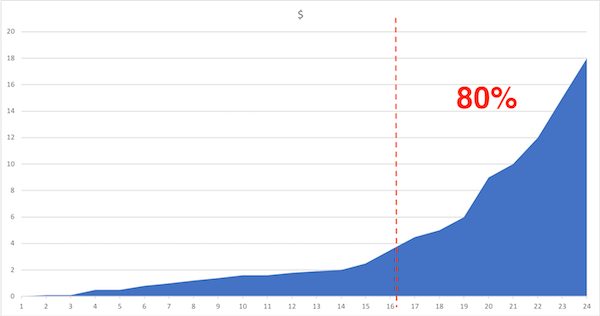I’ll be the first to admit:
I’m impatient.
Is this good or bad? (especially as an entrepreneur)
The answer might surprise you…
First, let’s make one thing clear:
When I have an idea for a new video, I want it filmed.
YESTERDAY.
If I need a graphic for a new article, I’ll give my designer exactly 27 seconds to find the perfect image.
(Sorry, Craig.)
So, yeah.
Patience is not my biggest virtue 😉
Now here’s the thing:
In one way, my impatience helped me build my business FAST.
However…
I also learned an important lesson over the years.
Sometimes being impatient is good for business. Sometimes being impatient is bad for business.
The secret is knowing the difference.
I’ll explain.
The Art of Being More Patient
My friend Ryan Holiday recently told me a great story about the art of being more patient…
Ryan had just published an article on Tim Ferriss’ blog – and it went viral.
Shortly after, a publisher emailed him:
“Let’s turn this into a book!”
The book offer would have been a dream come true for most writers – as it was for Ryan.
He turned it down anyway.
But why?
Well…
One of Ryan’s mentors, Robert Greene, suggested to turn the offer down:
“[Robert] said that I was still learning and improving as a writer—that my life experiences were accelerating and that the book would be better each day I waited.”
Wow.
Being patient is tough when a big opportunity like this is staring you in the face. And yet, Ryan followed the advice:
5 years later, he published The Obstacle is the Way. Ryan says he owes the book’s success to this lesson in patience.
(I think about this whenever I think about writing a book myself. When I do it, I want to do it right.)
The lesson is:
Sometimes it’s better to wait.
But being patient is not easy.
It takes a lot to wait for the right opportunity.
Of course, it matters what you do while you wait…
Why You Should Be Patient in Business
If you look up “patience” in the dictionary you’ll find this:

“Patience: the capacity to accept or tolerate delay, difficulty, or suffering without getting angry or upset.”
Notice how part of the definition of impatience is “getting angry” – NOT a good move in business.
So, as impatient as I am…
I believe patience is an important entrepreneurial skill.
Jeff Bezos, now the richest person in the world, agrees:
“We’ve had three big ideas at Amazon that we’ve stuck with for 18 years, and they’re the reason we’re successful: Put the customer first. Invent. And be patient.”
Amazon was patient. Other businesses failed because they were impatient:
WebVan, for example.
WebVan was a grocery delivery service in the 90s.
They raised $800 million because they wanted to “grow big fast.”
But they moved too quickly…
They built up a massive overhead, burned through the cash, and ultimately collapsed.
Why You Should Be a Patient Leader
Being patient is also important when you have employees.
Leadership coaches here and here agree that being impatient is bad for motivation and productivity.
Here are the main reasons leaders should be patient:
- Being impatient can be seen as disrespectful.
- Constantly telling people to “Hurry up!” hurts their productivity (it creates fear and frustration).
- Patience inspires a positive attitude and helps everyone see the big picture (important in difficult times when everyone is extra stressed out).
And by the way…
If you’re an employee, you should be more patient, too. This study showed that impatient people think less effectively and give up to soon.
With that said, I know first hand that being patient is hard.
Especially when you run a business.
Why Is Patience So Hard for Entrepreneurs?
I remember when I started my first blog.
This is before Social Triggers. Even way before I launched my first successful blog in the celebrity-niche back in the early 2000s.
Anyway…
I read an article about how to make money online.
I read how people were making $10,000 a month with ads.
Immediately, I thought:
And I was impatient…
I wanted to make $10,000.. STAT.
The problem?
I was so impatient, I took the wrong shortcut.
I’ll explain.
I quickly put up a blog and fired off emails asking people to promote my blog.
I didn’t know them. I had nothing to offer. I was just getting started. And the response I got was exactly what you’d expect:
Crickets.
Why?
Because, in this instance, I was too impatient.
I took a shortcut. But I left out some essential steps.
The thing is:
I knew what the steps were.
I knew I would have been more successful if I followed all the steps. But I was TOO impatient. Does this sound familiar?
Have you ever started a project, but you were too impatient to DO IT RIGHT? So you cut out crucial steps… and it blew up in your face?
Do You Suffer from “OSD?”
I call this OSD.
Obsessive Shortcut Disorder.
OSD means:
You’re cutting out important steps because you’re too impatient.
It’s a problem.
For example, if you’re creating a sales funnel, it’s a bad idea to cut out crucial steps from the sales process.
I know you want to launch ASAP.
Still, you shouldn’t cut important emails from your funnel.
Just because you’re impatient, you shouldn’t pitch your offer to someone who’s got no idea who you are. You’ll just annoy them. And you’ll lose a potential customer that will never come back.
Or, as another example… Don’t write a short, non-descriptive sales page, just because you’re too impatient to do it right.
Never take a shortcut if it means leaving out crucial steps. Trust me, in the long run you’ll pay for it. In time, in money, and in nerves.
Luckily, I had learned this lesson when I launched Social Triggers.
I was more patient.
I built my audience for almost a year before I sold anything. And my first launch was a big success.
That’s usually how it goes when you’re patient and trust the process. I see it all the time. The people who are patient AND work hard always get there.
Look at this:
TWO YEARS AGO today, Carrd officially launched with this tweet 👇
Since then, it's grown from zero to:
🙋 55k users
🌐 75k sites
💵 >$100k~80% of which came in the last 9mos 😱
None of this would have happened w/o your support, so I just wanted to say
THANK YOU 🙏
and … https://t.co/wfhv4XMvo6
— aj ⚡️ 🍜 (@ajlkn) March 7, 2018
AJ launched a software company.
In 2 years he made $100,000.
But notice how “80% came in the last 9mos.” Just to give you a visual, here’s what that looks like (without knowing the actual numbers):

16 months with barely any revenue. But with patience and persistence, 9 months later it’s a real business.
These are all examples where being patient is important for success.
But remember how I said there are times when NOT being patient helps?
So the question is:
When is it good to be IMPATIENT?
Here’s my experience…
When Should You Be Impatient? There Are Only TWO Good Reasons…
I already showed you how successful people are patient in the long-term.
But sometimes it’s better to be impatient.
Specifically, there are TWO reasons to be impatient.
I’ll explain.
Reason #1: Impatience is a GOOD thing whenever “be patient” is just an excuse for not getting sh*t done.
Yeah, you want to be patient.
That doesn’t mean you should take the long way on purpose.
I talk about it in this video:
(Make sure you subscribe to my YouTube show Planet Derek – I share a new video every day.)
It’s not really about taking shortcuts. You’re just taking the fast route.
Once you know the crucial steps, don’t waste time mulling them over 5 more times. Now it’s time to implement. And it’s a-okay to be impatient.
Notice I’m not skipping any crucial steps! I’m just working smarter. By taking the direct path.
Now…
Reason #2: Be impatient is when you’re not taking action because you’re stuck in your own head.
For example, maybe you’re worried about whether something might or might not work…
You know what?
The only way to find out is to try it!
So again, it’s ok to be impatient here.
Because…
“Clarity comes from action, not from thought”
What it comes down to is SPEED. The speed of making decisions. And the speed of getting things done.
If you’ve been on my email list for a while, you know this…
I act FAST.
For example, when Google made changes in Gmail, I wrote an email to my subscribers THAT day.
When Facebook changed their algo (again…) I quickly wrote a post about what to do.
When Periscope launched, I got excited. So I jumped on it and built an audience quickly. Periscope didn’t pan out. But that’s out of my control.
Same thing with Facebook Messenger.
When I saw it, I was impatient and tested it right away. I put a team member on it, and we came up with different tactics to test and try.
I quickly built a large list, because I acted fast.
Because I was impatient.
Now, you might be wondering:
What’s the best way to solve this “be patient” vs. “act fast” dilemma?
It’s pretty simple, actually.
This quote from Gary Vaynerchuk sums it up perfectly:
Macro patience, micro speed.
What it means is…
Be patient in the long-run. But act fast in the moment.
It’s only simple in theory, though.
In practice, it’s not easy.
So let’s talk about how to be more patient, if you’re an impatient entrepreneur, like I am.
How to Be More Patient: A Lesson From Bill Gates
Look, I’m not going to tell you to “breathe deeply.”
That might be good advice for dealing with road rage.
For entrepreneurs, I believe the key to more patience lies in the power of small wins.
I’ll explain.
In a 2011 Harvard Business Review article Teresa M. Amabile and Steven J. Kramer wrote:
“Of all the things that can boost inner work life, the most important is making progress in meaningful work.”
In other words, progress is what keeps us going.
Even if it’s a small step forward – it’s progress.
I know you want to move faster… Heck, I want to move faster!
But it’s important to recognize even the small wins.
Because the truth is:
The small wins add up.
Just like Bill Gates said:
“Most people overestimate what they can do in one year and underestimate what they can do in ten years.”
And as the small wins stack up, you get closer and closer to your big goal.
So, if you want to be more patient, take a moment and appreciate all the small wins. Look at the progress you’ve made… and keep going.
That’s my first piece of advice, from one impatient entrepreneur to another.
But I have 3 more tips I want to share.
3 (More) Tips to Practice Patience
The first tip is to notice the symptoms of impatience.
Tip #1: Notice the signs of impatience
What are they?
Here are the most common symptoms:
- Do you constantly feel rushed? It could be because you’re too impatient (or you might be at risk for entrepreneurial burnout)
- Are you anxious or nervous?<.li>
- Do you stay calm under pressure or do you panic?<.li>
- Do you make snap decisions that you regret later?
- Do you get angry when things don’t go your way?
I have to admit, my answer to more than one of those questions is “yes.”
It’s okay – we saw that impatience is part of an entrepreneur’s DNA.
That doesn’t mean we should just give in to it.
The first step, is recognizing when it happens.
Then…
Tip #2: Figure out what’s causing you to feel impatient
Why do you feel rushed?
What’s making you angry?
Why the panic?
Once you notice the symptom, figure out the cause.
Here are the most common ones:
- Did something unexpected change in your surroundings?
- Are other people not doing what you’d want them to do?
- Is a task more difficult than you thought?
- Are you just having trouble focusing? (here’s how to fix that)
Whatever is making you feel impatient, figure out what it is.
Maybe you’re just “hangry”… then have a snack already!
The point is:
Once you find the cause, you can work on finding a solution.
Usually, it’s as simple as…
Tip #3: Change your point of view
A while ago, we developed an in-house piece of software.
It was a complete disaster.
The developer was working slow.
To make things worse, he messed up, too.
Then he disappeared.
No one was there to fix it.
In this situation, I had every reason to be upset.
But I had a choice.
And the truth is:
Just because you’re impatient doesn’t mean other people will move faster. In fact, the opposite might happen…
All your impatience is doing is creating MORE stress.
The problem is: Some people can’t perform under pressure.
So you’re making them LESS productive.
And things take even longer.
Now, I’m not saying you should let people slack. Set a deadline. But when you see someone’s working on a problem, let them work.
This is only one example.
The thing to remember is this:
Impatience usually comes from things we can’t change – it’s important to accept that.
You can’t always change the situation.
But you CAN change your point of view.
Here’s how:
- Ask yourself: Is it always better go faster? (correct answer: no)
- Be patient with yourself – most things take time and effort to master.
- Remember to appreciate the small wins. Some progress is better than no progress.
- Realize that patience allows you to think more clearly because you stop feeling rushed.
- It’s not supposed to be “quick and easy” – good things take time.
These things help me be more patient when necessary.
I know, patience is a tough topic for entrepreneurs.
So let’s recap.
In Summary: Patience Vs. Impatience
Is patience a virtue or a vice for entrepreneurs?
The answer is…
It depends.
As an entrepreneur, it’s natural to feel impatient. That’s a GOOD thing because it helps you move fast in the moment.
But it’s BAD when you’re too impatient to trust the process in the long run.
Remember… Micro-speed. Macro-patience.
In the end, all the most successful entrepreneurs seem to agree. Patience is a good thing (but it’s hard):
“Patience is a virtue, and I’m learning patience. It’s a tough lesson.” – Elon Musk
Now I need to talk to my designer. Because…
Where are my graphics!?!
😉








Patient people enjoy better mental health. so one of the best articles, Patience helps us achieve our goals
very interesting article
Interesting, the whole post was a great collection of real-time examples from different places.
Derek, this post is an eye opener.
I’m an impatiently patient person — I’m not sure I’ll be able to have it balanced and appoint the right patience and impatience to the stuff that I do, sighs…
Thanks for the clues 🙂